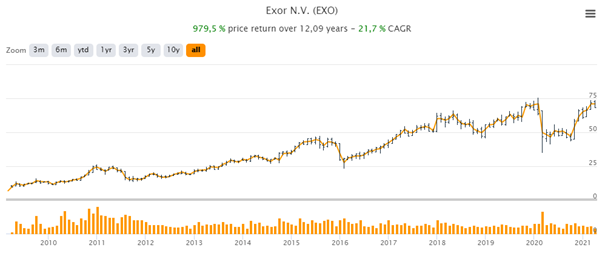
THREAD: $EXO.MI
What if I told you that you could invest in a rare combination of a family-controlled compounder and special-situation machine, with stellar management, at a ~35% discount to NAV with ongoing buybacks?
Disc.: I love Exor and it's a #neversell for me.
(1/15)
What if I told you that you could invest in a rare combination of a family-controlled compounder and special-situation machine, with stellar management, at a ~35% discount to NAV with ongoing buybacks?
Disc.: I love Exor and it's a #neversell for me.
(1/15)
Exor is an Italian holding company, with origins tracing back to the end of the 19th century when Giovanni Agnelli founded Fiat. In 1927, he established Istituto Finanziario Industriale (IFI), a holding company bringing together his holdings in Fiat and other sectors.
(2/15)
(2/15)
In 2009, IFI merged with IFIL to form Exor. Family-controlled companies tend to focus on long-term value creation rather than playing the quarterly earnings game; provided that mgt cares for minority shareholders and is proactive in taking advantage of market conditions.
(3/15)
(3/15)
John Elkann, Giovanni’s grandson and Exor’s Chairman and CEO, has a strong track record of value creation. Since Exor’s listing on March 1, 2009 and through 2020, NAV per share has compounded at 18.7% annually, crushing the MSCI World Index (11.4% CAGR).
(4/15)
(4/15)
Exor's stock has performed even better over the period due to the partial closing of discount to NAV, with close to 22% CAGR since inception, resulting in a ~11-bagger. A lot of this performance has been driven by the exceptional value creation from Marchionne at Fiat.
(5/15)
(5/15)

Anyone interested to learn more about Marchionne (hand-picked by Elkann) can read this HBR article on his Fiat makeover, or go through his "Confession of a Capital Junkie" presentation (a masterclass on capital allocation).
(6/15)
hbr.org/2008/12/fiats-…
(6/15)
hbr.org/2008/12/fiats-…
The role John Elkann played should not be minimzed. Since he took over, assets went from being almost fully cyclicals, to only 40% today. 60% of the portfolio is now in quality assets: luxury goods, media, and reinsurance.
(7/15)
(7/15)
He is managing the Exor portfolio very actively and leaves sentimental value aside: Fiat Chrysler spun off CNH and Ferrari; and just merged with Peugeot to form Stellantis at the beginning of this year. Another spin-off is planned at CNH Industrial.
(8/15)
(8/15)
Exor entered the reinsurance business through the PartnerRe acquisition in 2015. This deal reminds me of the Gen Re deal $BRK.B did in 1998. @ChrisBloomstran describes perfectly how Buffett used it to reduce Berkshire’s exposure to an overvalued stock market...
(9/15)
(9/15)
... , while avoiding selling its stock holdings. In the case of PartnerRe, it helped Exor to reduce its cyclical exposure, with a counter-cyclical bond portfolio offsetting its industrial positions.
(10/15)
(10/15)
During the 2019 Investor Day, Elkann underlined that Exor was looking at investing in luxury goods, media, and financial services. Since then, they announced the acquisition of stakes in Shang Xia and Christian Louboutin, two luxury goods companies.
(11/15)
(11/15)
To date and pro-forma of the recent FCA/PSA merger, Exor Gross Asset Value (GAV) is as follow:
Ferrari (23% ownership, 30% of GAV)
PartnerRe (100% ownership, 24% of GAV)
Stellantis (14.4% ownership, 22% of GAV)
CNH Industrial (26.9% ownership, 13% of GAV)
(12/15)
Ferrari (23% ownership, 30% of GAV)
PartnerRe (100% ownership, 24% of GAV)
Stellantis (14.4% ownership, 22% of GAV)
CNH Industrial (26.9% ownership, 13% of GAV)
(12/15)
Other holdings include Juventus, The Economist, GEDI, Shang Xia, Christian Louboutin, and a couple of other investments including Exor Seeds, which invests in early-stage companies.
(13/15)
(13/15)
At the current price of 69.8 EUR, Exor trades at a ~35% discount to NAV (valuing PartnerRe at the reported YE'20 valuation of €6.7B, when we know Covéa offered €7.5B last year for this asset). High vs. historical range, h/t @chriswmayer.
(14/15)
https://twitter.com/chriswmayer/status/1310932044751540225
(14/15)
I'm not here for the discount to NAV (although buybacks at this level are nice). Rather, it's a long-term bet on an exceptional capital allocator, John Elkann, who just only turned 45 years old and is slowly but surely transforming Exor into a high-quality conglomerate.
(15/15)
(15/15)
• • •
Missing some Tweet in this thread? You can try to
force a refresh


